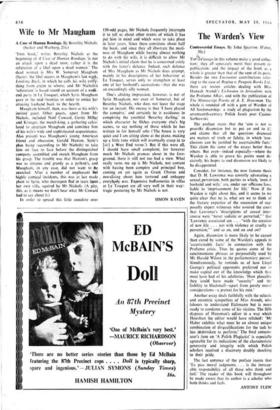The Warden's View
Controversial Essays. By John Sparrow. (Faber, 30s.)
THE C. essays in this volume make a good collec- tion : they all separately merit their present re- publication; and the impact of the book as a whole is greater than that of the sum of its parts. Besides the two Encounter contributions refer- ring to the case of Regina v. Penguin Books Ltd.. there are review articles dealing with Miss Hannah Arendt's Eichmann in Jerusalem. with the Profumo Affair, and with the publication of The Manuscript Poems of A. E. Housman. The whole is rounded off with a gem of Warden of All Soulsmanship: a study of plagiarism by the seventeenth-century Polish Jesuit poet Casimir Sarbiewski.
The preface states that the 'aim is not to provote dissension but to put an end to it'; and claims that all the questions discussed are matters of truth or falsity, in which 'con- clusions can be justified by ascertainable facts.' This claim fits some of the essays better than others. But even—indeed especially—where the Warden is able to prove his points most de- cisiverY, his hopes to end dissension are likely to be disappointed.
Consider, for instance, the now famous thesis that D. H. Lawrence was covertly advocating a sexual, perversion, both parties to which, 'even if husba'nd and wife,' are, under our officious laws, liable to 'imprisonment for life.' Now if the Warden is right about this, and it seems to me quite clear that he ,is, what are we to think of the literary expertise of the succession of sup- posedly expert witnesses who assured the court that Lawrence's 'descriptions of sexual inter- course were "never sadistic or perverted,"' that `Lawrence associated sex . . . "with the creation of new life . . . not with violence or cruelty or perversion," ' and so on, and on and on?
Again, dissension is more likely to be caused than cured by some of the Warden's appeals to `ascertainable facts' in connection with the Profumo crisis. Thus he quotes some of the sanctimonious phrases so purposefully used by Mr Harold Wilson in the parliamentary pursuit. Simultaneously, he reminds us of how Lloyd George's political opponents preferred not to make capital out of the knowledge which they must have had of his adulteries. 'How plausibly they 'could have made "security" and the liability to blackmail—apart from purely moral considerations—a pretext for his ruin.'
Another essay deals faithfully with the eclectic and eccentric sympathies of Miss Arendt, who labours to understand Eichmann but is more ready to condemn some of his victims. The fifth disposes of Housman's editor in a way which Housinan the editor would have relished: 'Mr Haber exhibits what must be an almost unique combination of disqualifications for the task he has undertaken to perform.' The final connois- seur's item on 'A Polish Plagiarist' is especially agreeable for its indications of the characteristic generosity and integrity with which Polish scholars received a discovery doubly shocking to their pride.
The last sentence of the preface insists that `To paSs moral judgments . . . is the inescap- able responsibility of all those who think and feel.' The reader of this book will throughout be made aware that its author is a scholar who both thinks and feels.
ANTONY FLEW


































 Previous page
Previous page